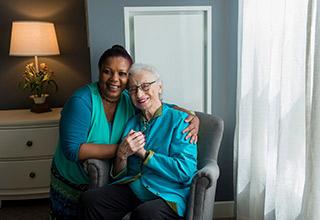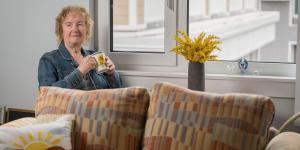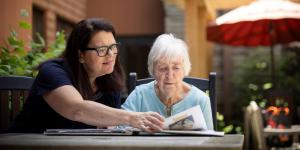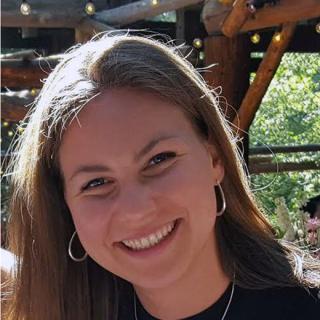Taking Care of Our Employees: English Language Development
Supporting professional and personal development
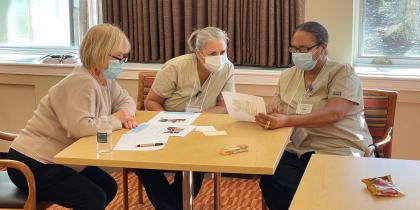
Diverse workplaces are terrific. The mixing of different cultures and perspectives strengthens organizations. However, diversity is not without its challenges. One stumbling block when people speak different native languages can be communication.
Like many places that provide medical care, Hebrew SeniorLife depends upon a wide variety of people, including non-native English speakers. They contribute to the organization in innumerable ways and bring their unique perspectives to the workplace and to the care they provide patients and residents.
Though a large number of these employees want to improve their English language skills, most class options for adults can be hard to access, especially for those who don’t work a typical 9-5 work day. Night classes are not a good option if you work nights—just ask a nurse. Even if the schedule works, there can be additional challenges such as traveling to off-site locations or finding child care.
Reflecting our values
None of the work we do across Hebrew SeniorLife would be possible without our employees. This is true across all levels of the organization from executive management to, especially, frontline workers.
We live by a set of cultural beliefs that guides our interactions with patients, residents, families, and each other. It’s these cultural beliefs - especially the ones called “Grow Professionally” and “Speak Up” - that are part of the reason why we place such a huge emphasis on providing employees with the training and resources they need to effectively do their work and advocate for the seniors and families they work with. Training opportunities are not only rewarding for individual employees, they allow us to continually advance the quality of our care.
Accordingly, Hebrew SeniorLife has implemented programs to encourage professional development including scholarship programs, tuition reimbursement, and support from colleagues and mentors. For example, we recently launched a CNA (Certified Nursing Assistant) training program to certify new nurse’s aides. This creates a direct pipeline to [employment and career advancement](https://www.hebrewseniorlife.org/about-us/careers-hebrew-seniorlife) at Hebrew SeniorLife and helps address the severe shortage of health care workers across the country. We also offer a nurse residency program for new RN graduates, to provide them comprehensive support and mentoring as they begin their careers.
Creating a better option
Before I joined Hebrew SeniorLife, I did a lot of volunteer work teaching English classes so I was familiar with the available options for language courses. After realizing how inconvenient those options were for many Hebrew SeniorLife employees, I wanted to create a practical alternative to address that need. As the Program Manager for Volunteer, Youth, and Community Engagement I was in the right position to design and launch this kind of program. Given the supportive history of Hebrew SeniorLife, I was not surprised when I got the go-ahead.
Eventually, I developed the SEED program (Supporting English for Employee Development). A free program for all employees that was first held on-site at NewBridge on the Charles, then expanding to Hebrew Rehabilitation Center. SEED comprises a mix of online and in-person offerings, all of which focus on conversational proficiency and real-world usage. The class is ideal for those who have rudimentary verbal knowledge of English but struggle to understand idioms, workplace terminology, or cultural references.
Part of the classes involves role-plays and scenarios drawn from students’ work contexts, where they communicate with patients in different settings such as a physical rehabilitation center or on a memory care floor. I work with managers to identify particular needs or proactively address difficult situations, like gently enforcing COVID-19 visiting protocols. Empowering employees to clearly explain and deescalate such situations helps the workday run more smoothly—making staff members more confident in their role on the team. Furthermore, improved English comprehension helps minimize communication errors with supervisors.
We also focus on scenarios outside the workplace such as finding specific items in grocery stores and visiting a doctor.
The program is designed for self-directed learning: being able to learn what students want to learn versus just blindly going through a curriculum. Taking cues from their questions allows us to explore and role-play different situations.
Without a predetermined roadmap of what “should” be taught, we can be flexible and meet students’ real needs and interests. By employing a general framework rather than heavy instruction, students spend much more time talking—and actually learning—than they would by just listening to me. The aim is to provide appropriate tools and point students in the right direction, then to get out of the way and let them navigate their own learning.
Another important aspect of creating a good learning experience involves organizing the students into smaller groups. These supportive cohorts give the employees further motivation to learn, incentive to practice, and a welcoming environment to keep them coming back to class.
We’ve also trained volunteers to help create this comfortable and stimulating class atmosphere. Part of their training involves identifying students who are what we call false beginners: those who may have been in the U.S. for a long time and picked up enough English to “get by.” They might mask what they don’t know by plugging the right phrases into conversations but struggle to fully engage. Volunteers learn to spot students who are just nodding along. They can then engage those students, gently providing some of the missing information to help them improve.
Best of all, some of the volunteers are residents of Orchard Cove, a Hebrew SeniorLife continuing care retirement community in Canton. Not only do they help with the classes, but the volunteers themselves benefit as they create connections across different cultures and generations. As one volunteer told me, “As we learn more and more about who our students are, we connect with them. They’re really part of our lives.” These kinds of bonds foster a sense of understanding between residents and staff, making for a closer-knit community.
Supporting career advancement
Like any other skill, practicing a language generates confidence. Many teachers will tell you that talking with other people is the most effective way to really learn a language. However, not knowing how to respond during a conversation and struggling to find the right words is an intimidating and difficult process. This can lead to a negative cycle: students don’t improve because they don’t practice, and they don’t practice because of a lack of assuredness. Without a supportive and learning environment, students might not build the confidence necessary to continue improving their English skills.
Speaking on a conversational level unlocks other things outside of English-specific programs— professional advancement being a big one. There are lots of people in the medical field in the U.S. who hold a higher level of certification in their home countries. I’ve had students come up to me and say “I know how to deliver a baby and hook someone up to an IV and all this other knowledge. But the language barrier is what's really keeping me back.”
The SEED program helps employees to start breaking through that language barrier and act as a bridge to further learning. A Certified Nursing Assistant (CNA) might continue their education advancing to a Licensed Practicing Nurse (LPN) and from there to a Registered Nurse (RN). Perhaps culinary workers find themselves in a better position to take advantage of a new position on the management team.
Improving English skills is more than just a personal gateway to professional improvement. According to the U.S. Bureau of Labor Statistics, there are 524,000 fewer health care workers since February 2020.
As the baby boomer generation ages, the total number of people over 65 increases every day. The older we get the more medical care we need, so the combination of an aging population with a decreasing number of health care workers is very concerning. We must do everything possible to encourage recruitment and retention of nurses and other workers that provide essential care and services.
Helping existing health care workers improve their English skills, opens the door for further education and certification, which could fill critical skill gaps in the industry.
Getting results
So far, we’ve had a total of 38 students participate in the SEED program with some coming back to take more classes over the course of two or three years. Some have even signed up for more formal English classes outside HSL.
This participation shows how our employees have a desire to invest in their growth and the value they place in improving their language skills. It’s meaningful for people. The effects extend into personal lives with one participant proudly sharing, “My daughter says that I talk much better now. She says ‘Mommy, wow! Look at you.’”
In addition to the professional and personal value that students get from the SEED program, there’s a great sense of camaraderie that emerges from these classes. The cohorts are really mixed in terms of departments and locations. There can be a server or member of the kitchen staff in class alongside a personal care assistant. That creates a broader sense of community, which is one of Hebrew SeniorLife’s main tenets.
From an organizational level, it makes a lot of sense to invest in your employees. Especially now with headlines about the “Great Resignation” and a shortage of health care workers, it’s much smarter to retain and develop your existing employees than to count on being able to recruit new talent. Many participants comment to me that they feel really grateful that Hebrew SeniorLife nurtures their employees, cares about them, and offers the SEED program as an opportunity.
So many of the people working really tough frontline jobs at Hebrew SeniorLife have the emotional intelligence and sheer capacity to rise within the organization. We want them to stay and we want to make it easy for them to stay here. I think this is one of many ways to accomplish that.
Careers Page
Join Our Team
From direct patient care, nursing, and life enhancement to culinary support and research, we have opportunities for you to make a difference in the lives of seniors while building a rewarding career.
